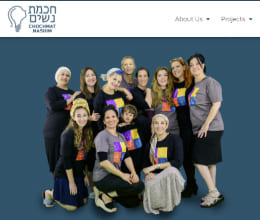In today’s Orthodox world, there are actors who see it as their mission to prove that Jewish marriage is meant to be a trap, that men are within their rights to withhold a woman’s freedom, and that divorce is a decision to be made solely at a man’s discretion.
They have a YouTube channel dedicated to the craft, websites designed to humiliate divorced women and the children they believe to be illegitimate, and clubs where they train other men how to deny their wives a Jewish divorces. I am not linking to these sites: I don’t want my readers’ clicks to give them more page views, nor add to the pain of the women they slander, but they are there. I promise.
They do this while slandering the female activists who are fighting for their sisters chained in marriage, often to these very same bad actors, as clowns and “feminists.”
I find this to be abhorrent, not only as a person who sees women as full human beings, but as a Jew who loves and honors Torah as the most moral and compassionate system known to mankind. To claim that it is the Torah that is abusive, and not the men who wield Jewish law as a weapon, is in my mind, blasphemy.
It’s true that to our modern ears, many aspects of the ways that women are discussed in the Torah and traditional Jewish texts are shocking and painful, with women mainly acted upon and having little agency. To read the texts with the correct understanding, we must recall that the Torah was given over 3,000 years ago to a world and society where slavery was accepted practice, spoils went to the victors, and a woman’s worth was solely in her… womb.
Women were often stolen, raped, beaten, and even sold (think Sara, Dina and Isaac’s concern for Rebecca being abducted). Without a male relative’s protection, they were at great risk of exploitation and death. At that time, women — girls — could be forced into marriage. In marked contrast, I believe that Torah and Jewish tradition attempted to create a nation in which it was clear that a woman must freely give her consent to be in a marriage for that marriage to be valid.
Below, I bring examples of Torah laws and traditions that pertain to women’s safety and sexuality, which explicitly remove the man’s ability to act upon his own rage/lust, tempering the actions he could take. I believe that God understands man’s temptation to abuse and that power corrupts, and has thus set down Torah laws to curb that abuse, mitigating the effects of the physical and cultural power that men traditionally hold over women. If we are going to live in the ways of God, that is what we must continue to do today.
Even, or especially, in the Torah laws that seem most degrading to women, I see the Torah trying to protect women from a worse fate. These passages are still hard to read or contemplate, but doing so helps us understand that protecting women from abuse was always, and must remain, a priority in Jewish tradition.
Sotah — the suspected adulteress
Bamidbar 5:12-31 states that a man who suspects his wife of adultery, or feels a “fit of jealousy” regarding her and another man, may bring her to the kohen [ritual priest] to give an offering. The woman has the choice to either confess directly, and be divorced, or go through a ritual in which her hair is “disheveled” and she drinks a mixture of water and the erased portion of the Torah that includes the name of G-d and the punishment of the Sotah. If she chooses the trial, she returns home afterwards to either await death as divine punishment, or exoneration if she lives.
To be sure, this public humiliation sounds nightmarish and cruel. But, consider what men were, and still often are, apt to do to their wives caught with another man — or even suspected of being with another man. Consider when a man might do to a wife whom he simply doesn’t want to support any longer. Even today, “honor killings” are not a thing of the past, nor is disfigurement, beatings, or stonings of women suspected of dishonoring men.
According to tradition, this ritual was never actually practiced, but instead served as a deterrent, a guide for behavior, as other laws in the Torah do. In this case to curb men’s jealous, violent rages or tossing a woman out of her home on false premises of unproven adultery and to also warn women against adultery.
The laws of Sotah are strict. A man must warn his wife in front of two kosher witnesses against being secluded for a certain amount of time with a specific man. Then, in order to accuse her, she must have been seen in seclusion with that man for that time. Only then does the accused wife face a choice: refuse the trial and leave her marriage or prove her innocence before God. What cannot happen under Torah law is the man taking matters into his own hands and abusing or abandoning her. Even when accused and tried, judgment is removed from the hands of man and given to God — the only one who can be relied upon for justice. Recall, the woman can refuse the trial and leave the marriage. If she chooses to endure it, the trial is meant to reestablish trust and thus the sanctity of the marriage.
Eshet Yifat To’ar – a female prisoner of war
It is important to note before discussing the Eshet Yifat To’ar that this practice is no longer allowed today
Devarim 21:10-14 discusses a soldier in war who desires a woman (is overcome with lust) during the heat of battle. The concept of carrying a captive woman off during war is something many of us could not contemplate prior to October 7, 2023, but is now all too horrifically real.
According to the Torah, if he cannot control his lust and he rapes her on the spot, he must take her to his home, care for her, let her cry for her parents for a month, and then diminish her beauty by growing her nails and shaving her head. During this month of mourning, the man cannot force himself on her, and at the end of the month, he must either marry her and give her full rights as a wife or let her go.
In this example, again intended for an audience much different than our current Western society, a Jewish soldier at the time of the Torah is forced to care for a woman who he has hurt in his own home, facing the consequences and bearing the responsibility for his inability to control his lust. If he still wants her after the initial 30 days, he must offer her conversion and marriage, which is a contract that requires her consent. If she refuses him, or if he doesn’t desire her as a wife, he must let her go and may not sell her to anyone else.
Marriage and divorce
Devarim 24:1: “A man takes a woman [into his household as his wife] and becomes her husband. If she doesn’t find favor in his eyes because he finds something obnoxious about her, he writes her a bill of divorcement, hands it to her, and sends her away from his house.”
While the Torah gives a man the power to decide that he no longer wants to be married to and responsible for his wife, the Torah also says he cannot simply kick her out of his home. He must provide her with a document of divorce that proves she is no longer married so that she can remarry and have children. Women were utterly reliant on their male relatives. As a rule, they did not own property, have trades, jobs, or independent wealth. If they were not in their parents home, they had to marry in order to have shelter, food, and clothing.
Again, this was implemented as a protective measure to prevent a man abusing/ignoring or simply abandoning his wife, leaving her without protection and without the ability to move on.
Any man who leaves his wife without this document is guilty of transgressing a Torah commandment, every single minute of every single day.
Ketubah
The ketubah, or Jewish marriage contract, was written to enshrine a man’s obligations to his wife during marriage and what he must provide her in the event of divorce. The ketubah was so important to the integrity of the marriage that according to Rambam and other predominant opinions it is the determining factor between a pilagshut (concubine) and wife relationship. Without the ketubah, sex is rabbinically prohibited and the sages term it harlotry. Indeed, the rabbis decreed that a man was forbidden from living with his wife, even for one hour, without a ketubah.
Halachic tools to end marriage
Jewish marriage is a sacred relationship not only between a man and a woman, it is also a sacred relationship between the couple and the community. A man marries a woman according to the laws of Moses and Israel in front of witnesses, making that couple a part of the community and subject to the laws that bind that community.
If that marriage was done with deception, is abusive, under false pretenses, or there is a significant flaw within one of the parties, that marriage may well be invalid. The tools of bittul kiddushin (annulment) have been used for millennia to end marriages without a get when a spouse was recalcitrant or incapacitated.
In addition, a beit din (rabbinic court) is allowed to coerce a man to provide his wife with a get if he is recalcitrant and they determine that she indeed has the right to a divorce — “he is forced until he says, ‘I want to!’”. He is not allowed to hold her captive.
Which brings us to today
Today, women in Western societies are highly educated, can own property, are learned, and employable. Suspected adulteresses are generally no longer maimed or murdered. Women are no longer at risk of death or exploitation if they’re unmarried. The issues that women faced 3,000 years ago are, for the most part, no longer relevant in today’s Jewish communities. And yet we have new issues, sometimes caused by the very practices that were once enacted to protect women, which now harm them deeply.
I speak, of course, of agunot/mesuravot get, women whose husbands deny them a Jewish divorce. Instead of using the Torah and Jewish tradition to protect women, these husbands use it to abuse, in direct opposition to the honor that’s traditionally afforded to Jewish marriage and Jewish women.
These abusers shame God, Torah and Judaism. They worship power instead of God. They honor themselves, not the Torah.
The halachic prenup is the latest step in a chain of rabbinic, halachic mechanisms that have been enacted to save Jewish marriage from abuse. By disincentivizing get-refusal, it lowers the risk of abuse of Jewish marriage.
Halachic tools used to invalidate a marriage used to abuse are holy. They continue the Torah tradition of honoring and protecting Jewish women and Jewish marriage. People who live a Torah life must, by necessity, support the movement to end get abuse and release Jewish women chained to dead marriages. Women who seek to protect their sisters – call them feminists! – are indeed following in the footsteps of the original defender of women: God.


